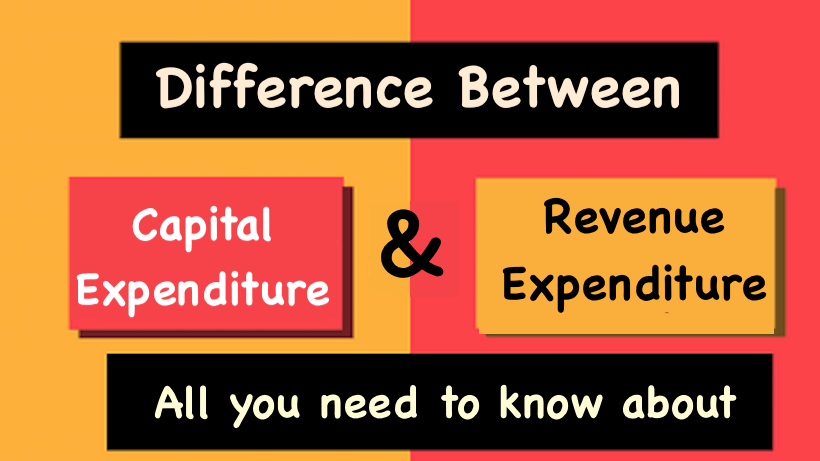Comparison between Capital Expenditure and Revenue Expenditure, check out difference between capital Expenditure and Revenue Expenditure.
Capital Expenditure: This represents expenditure incurred for the purpose of acquiring a fixed asset which is intended to be used over long term for earning profits there from. e. g. amount paid to buy a computer for office use is a capital expenditure. At times expenditure may be incurred for enhancing the production capacity of the machine. This also will be a capital expenditure. Capital expenditure forms part of the Balance Sheet.
Revenue expenditure: This represents expenditure incurred to earn revenue of the current period. The benefits of revenue expenses get exhausted in the year of the incurrence. e.g. repairs, insurance, salary and wages to employees, travel etc. The revenue expenditure results in reduction in profit or surplus. It forms part of the Income statement.
Comparison Chart
| BASIS | CAPITAL EXPENDITURE | REVENUE EXPENDITURE |
|---|---|---|
| Meaning | The expenditure incurred in acquiring a capital asset or improving the capacity of an existing one, resulting in the extension in its life years. | Expenses incurred in regulating day to day activities of the business. |
| Term | Long Term | Short Term |
| Capitalization | Yes | No |
| Shown in | Income Statement and Balance Sheet | Income Statement |
| Outlay | Non-recurring | Recurring |
| Benefit | More than one year | Only in current accounting year |
| Earning capacity | Seeks to improve earning capacity | Maintain earning capacity |
| Matching concept | Not matched with capital receipts | Matched with revenue receipts |
Comparison between Capital and Deferred Revenue Expenditure:
The main feature of capital expenditure is that it results in a benefit which will accrue to the business enterprise for a long time, say 10 or 15 years. Deferred revenue expenditure also results in a benefit which will accrue in future period but generally for 3 to 5 years.
Advertisement
Content in this Article
The capital expenditure or the resulting asset is usually capable of being reconverted into cash though may be at a loss. This is not possible in the case of deferred revenue expenditure. At times, heavy loss such as loss due to earthquake is treated as deferred revenue expenditure in the sense that they are written off over a period of 3 to 5 years. Such a loss cannot be treated as a capital expenditure.
Capital Expenditure
Capital expenditure can be defined as expenditure incurred on the purchase, alteration or improvement of fixed assets. For example, the purchase of a car to be use to deliver goods is capital expenditure. Included in capital expenditure are such costs as:
- Delivery of fixed assets;
- Installation of fixed assets;
- Improvement (but not repair) of fixed assets;
- Legal costs of buying property;
- Demolition costs;
- Architects fees;
Revenue Expenditures
Revenue expenditure is expenditure incurred in the running/management of the business. For example, the cost of petrol or diesel for cars is revenue expenditure. Other revenue expenditure:
- Maintenance of Fixed Assets;
- Administration of the business;
- Selling and distribution expenses.
Deferred Revenue Expenditures
Deferred revenue expenditures represent certain types of assets whose usefulness does not expire in the year of their occurrence but generally expires in the near future. These type of expenditures are carried forward and are written off in future accounting periods. Sometimes, we make some revenue expenditure but it eventually becomes a capital asset (generally of an intangible nature). If one undertake substantial repairs to the existing building, the deterioration of the premises may be avoided. We may engage our own employees to do that work and pay them at prevailing wage-rate, which is of a revenue nature.
If this expenditure is treated as revenue expenditure and the current year‘s-profit is charged with these expenses, we are making the current year to absorb the entire expenses, though the benefit of which will be enjoyed for a number of accounting years. To overcome this difficulty, the entire expenditure is capitalised and is added to the asset account. Another example is an insurance policy.
A business can pay an insurance premium in advance, say, for a 3 year period. The right does not expire in the accounting period in which it is paid but will expire within a fairly short period of time (3 years). Only a portion of the total premium paid should be treated as a revenue expenditure (portion pertaining to the current period) and the balance should be carried forward as an asset to be written off in subsequent years.
AS 26 – Intangible Asset does not accept this view. Para 56 states, Expenditure incurred to provide future economic benefit to an enterprise that can be recognized as an expense when it is incurred. e.g., expenditure incurred on Scientific Research is recognized as an expense when it is incurred‖. In short, the whole amount of expenditure is treated as expense for the current year only and will not proportionately be transferred as deferred charge.
Recommended

